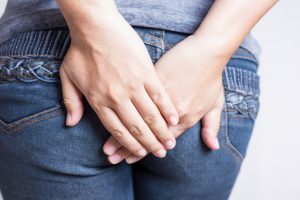How Do Hemorrhoids Develop?
 At some point in your life, you’ll probably have hemorrhoids. In fact, these bulging veins on your rectum and anus are more common as you get older.
At some point in your life, you’ll probably have hemorrhoids. In fact, these bulging veins on your rectum and anus are more common as you get older.
What Are Hemorrhoids?
Hemorrhoids (which are also called piles) are bulging and irritated veins just beneath the mucous membranes that line the lowest part of your rectum and anus. They’re similar to varicose veins in your legs.
They can be internal (which occur in the lower rectum) or external (which occur under the skin around the anus. External hemorrhoids are usually more annoying, because the skin over them gets irritated. In some cases, a blood clot can form inside it, causing severe pain. Internal hemorrhoids usually don’t hurt, but they can cause bleeding. Sometimes they can extend beyond the anus and become irritated and itchy.
How Do Hemorrhoids Develop?
The following can make you more likely to develop hemorrhoids:
- Genetics – If your parents or other close family members had hemorrhoids, you may be more likely to get them as well
- Obesity or pregnancy – Extra weight can make veins in your lower rectum swell
- Pushing during bowel movements
- Straining when you lift something heavy
- Standing or sitting for long periods of time
- Chronic constipation or diarrhea
- Eating a low-fiber diet
How Are Hemorrhoids Treated?
Conservative treatments are often effective for treating hemorrhoids. They include the following:
- Sitz baths – Sit in about 3 inches of warm water for 15 minutes several times a day, especially after you’ve had a bowel movement
- Petroleum jelly – Gently put a little inside your anus, and bowel movements will be less painful
- Over-the-counter medicines – These can help reduce irritation and itching
- Cold pack – A cold pack on the area can reduce swelling
- More fiber – Eat a diet that has plenty of high-fiber foods like fruits, vegetables, nuts and whole grains; your doctor may also recommend a fiber supplement
- Plenty of water – Drink at least 7 to 8 glasses of water a day
You can sometimes use these self-care methods to care for mild hemorrhoids at home. But if you have bleeding or your hemorrhoids aren’t getting better, you’ll need to see your doctor.
If necessary, your doctor may perform one of the following procedures:
- Injection – A solution can be used to inject an internal hemorrhoid so it scars and closes off
- Rubber band ligation – This procedure lets your doctor put a tiny rubber band around the hemorrhoid, which cuts off its blood supply so it will dry up and fall off
- Coagulation or cauterization – Your doctor can remove tissue and seal the end of a hemorrhoid using a laser beam or other method
- Hemorrhoidectomy surgery – Traditional surgery is sometimes needed to remove large internal hemorrhoids or external ones that are very uncomfortable
If you’re suffering from hemorrhoids, make an appointment today with Gramercy Park Digestive Disease Center in the New York metropolitan area. We specialize in compassionate, personalized care designed to meet each patients’ needs.


